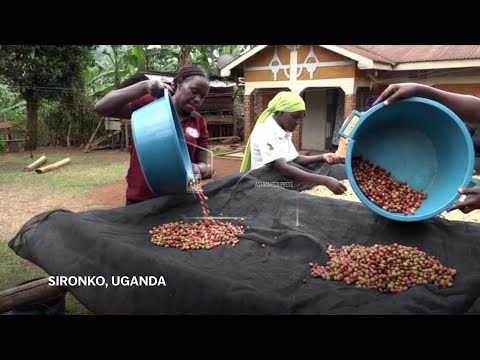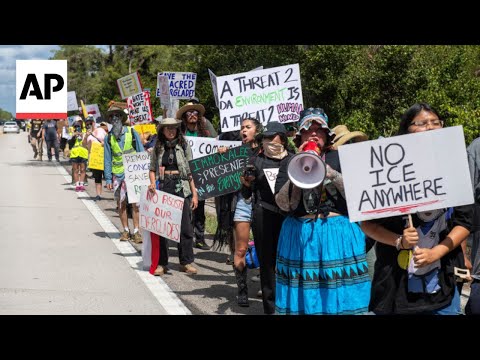(10 May 2025)
RESTRICTION SUMMARY:
ASSOCIATED PRESS
Sironko, Uganda – 15 March 2025
1. Mid of women sorting coffee berries as part of the Coffee Sisterhood initiative
2. SOUNDBITE (English) Meridah Nandudu, coffee farmer, founder of Bayaaya Specialty Coffee: ++PARTIALLY OVERLAID BY SHOTS 3 AND 4++
"Initially, women had been so discouraged about coffee in a way that when you look at the coffee value chain, women do the donkey work. It is the women that are planting, when it comes to weeding, harvesting, pulping, fermentation, washing and our fathers come at the point when this coffee is ready for selling.”
3. Various of woman harvesting coffee berries
4. Various of woman dropping coffee berries into bucket
5. Wide of Nandudu and other women spreading and sorting coffee berries
6. SOUNDBITE (English) Meridah Nandudu, coffee farmer, founder of Bayaaya Specialty Coffee: ++STARTS ON SHOT 5 AND PARTIALLY OVERLAID BY SHOTS 7 TO 9++
"We came up with an idea where a woman’s coffee was fetching a slightly higher price than that one of a man. If a woman delivered coffee, it would earn that family 200 shillings plus on a kilo. So, that motivated the men to trust their women to sell the coffee. So, when the women sell the coffee, she has a hand in it, she knows how much we have sold this coffee (for). So, through this we have witnessed reduction levels of gender-based violence in our communities and then the women have been empowered.”
7. Women leaving coffee plantation carrying buckets
ASSOCIATED PRESS
Mbale, Uganda – 14 March 2025
8. Various of woman in coffee bean testing laboratory
9. Various of Nandudu and colleague roasting coffee beans
10. Close of coffee beans
11. Mid of coffee roasting machine
ASSOCIATED PRESS
Sironko, Uganda – 15 March 2025
12. SOUNDBITE (English) Juliet Kwaga, coffee farmer: ++PARTIALLY OVERLAID BY SHOTs 13 AND 14++
"When I grew up, by then mum was not participating in this coffee things. Her work was only to be at home as you know those are those days. But now, these days things have changed because I can buy food in a home as a woman, I can take my children to school as a woman and still, I also have some money as a woman in the home."
13. Various of Nandudu, Kwaga and other women picking coffee berries
ASSOCIATED PRESS
Mbale, Uganda – 15 March 2025
14. Various of Nandudu checking coffee quality at coffee collection point
STORYLINE:
Meridah Nandudu envisioned a coffee sisterhood in Uganda, and the strategy for expanding it was simple: Pay a higher price per kilogram when a female grower took the beans to a collection point.
It worked. More and more men who typically made the deliveries allowed their wives to go instead.
Nandudu’s business group now includes more than 600 women, up from dozens in 2022.
That’s about 75% of her Bayaaya Specialty Coffee’s pool of registered farmers in this mountainous area of eastern Uganda that produces prized arabica beans and sells to exporters.
“Women had been so discouraged by coffee in a way that, when you look at (the) coffee value chain, women do the donkey work,” Nandudu said. But when the coffee is ready for selling, men step in to claim the proceeds.
Her goal is to reverse that trend in a community where coffee production is not possible without women’s labor.
Uganda is one of Africa’s top two coffee producers, and the crop is its leading export.
The east African country exported more than 6 million bags of coffee between September 2023 and August 2024, accounting for $1.3 billion in earnings, according to the Uganda Coffee Development Authority.
Find out more about AP Archive: http://www.aparchive.com/HowWeWork
Twitter: https://twitter.com/AP_Archive
Facebook: https://www.facebook.com/APArchives
Instagram: https://www.instagram.com/APNews/
You can license this story through AP Archive: http://www.aparchive.com/metadata/youtube/a7afa2da68b442b59b5267a0ece74ad3
Author: AP Archive
Go to Source
News post in May 15, 2025, 6:04 am.
Visit Our Sponsor’s:
News Post In – News





